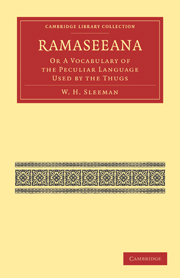
-
Select format
-
- Publisher:
- Cambridge University Press
- Publication date:
- October 2014
- June 2011
- ISBN:
- 9780511984426
- 9781108028752
- Dimensions:
- Weight & Pages:
- Dimensions:
- (216 x 140 mm)
- Weight & Pages:
- 1.03kg, 824 Pages
You may already have access via personal or institutional login
Book description
Thugs, or thuggees, were members of secretive gangs that robbed and sometimes murdered travellers in India; they were also said to worship the Hindu goddess Kali. The British colonial administrator William Henry Sleeman (1788–1856) took a special interest in these gangs and mounted a campaign to eradicate them. Between 1826 and 1840 thousands of Thugs were imprisoned or hanged. The outcome of the operation was due in part to Sleeman's focus on gathering intelligence about the gangs' coded communications. This substantial vocabulary, published in 1836, was compiled from conversations with informers and interrogations of prisoners. It includes words such as adhoreea, which means an intended victim who escaped being murdered, or dhurohurkurna, which is the verb 'to strangle'. The book contains much fascinating data for linguists and historians, and includes an appendix of cases and depositions that constitutes a useful source on crime in colonial India.
Contents
Metrics
Full text views
Full text views help Loading metrics...
Loading metrics...
* Views captured on Cambridge Core between #date#. This data will be updated every 24 hours.
Usage data cannot currently be displayed.
Accessibility standard: Unknown
Why this information is here
This section outlines the accessibility features of this content - including support for screen readers, full keyboard navigation and high-contrast display options. This may not be relevant for you.
Accessibility Information
Accessibility compliance for the PDF of this book is currently unknown and may be updated in the future.


